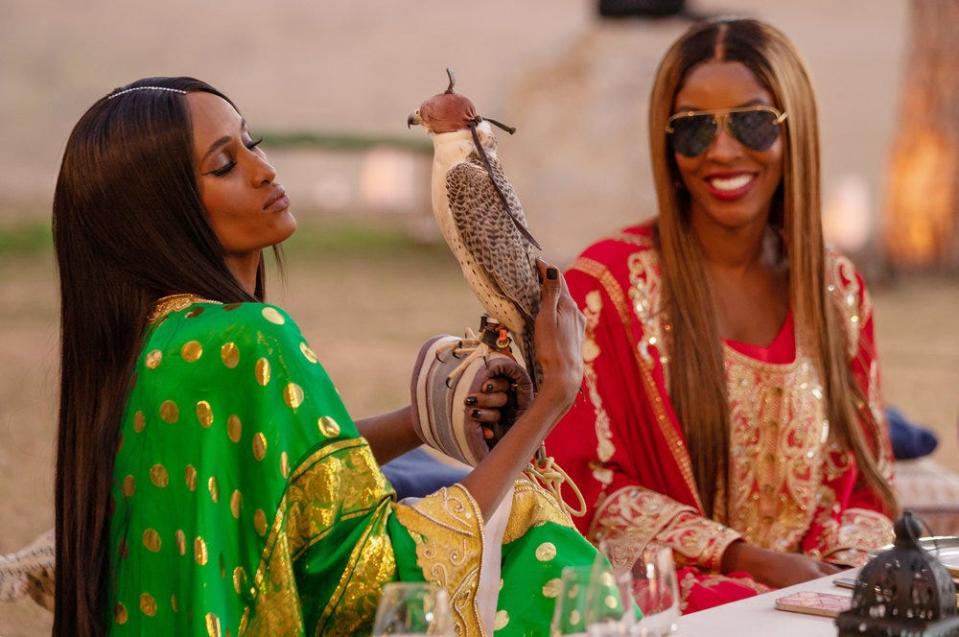'Real Housewives of Dubai' star Chanel Ayan says she survived female genital mutilation at 5
Model and reality TV star Chanel Ayan opened up about her childhood trauma during an emotional hypnotherapy session on Wednesday's episode of "Real Housewives of Dubai."
Ayan's co-star Sara Al Madani held her hand as she shared that her childhood was filled with a lot of "crying" and "beating."
The Ethiopian and Somali model, who was born in Kenya, then revealed to the therapist that she and her older sister survived female genital mutilation and were circumcised as children.
"At 5 years old, my aunt and my grandma came to pick us up to take us to another town," Ayan recalled through tears. "And then the next morning at 6 a.m., I didn't know where I was going whatsoever and then they took us to this man's house and they just tied us on the bed and we were circumcised."

See also: What is female genital mutilation?
She continued: "We were tied in the legs. Couldn't pee. Couldn't move. When we needed to pee, they would carry us and put us on the grass. I just didn't understand what the hell was going on whatsoever and my mom didn't know that that was happening to us."
In a confessional, the Bravo star said her vaginal area was sewn shut — a procedure she had medically reversed when she met her husband Christopher.
"I couldn't have sex," she explained. "And then I had to wait until I healed."
Ayan said she later learned the FGM was done to ensure she was a virgin when she got married for dowry.
'This matter is vindictive': Federal judge throws out landmark female genital mutilation case
"It's abuse. I don't think our girls should be going through this," she continued. "The reason that I'm talking about it is to bring awareness to it and I want people to understand this happens every single day. If I could stop it and if that's my mission, maybe that's what I should be doing."
Ayan later revealed that her father also tried to sell her into marriage at age 14 but "it didn't happen because my sister protected me."
Despite the hardships she's faced, the model said, "I actually love life, that is the sad part."
"I like to be happy. I have a good family, so I'm not going to say I'm a victim because I really am not," Ayan said. "I have a good life. These are just the saddest things in my life, but I have a good life."

Bravo's 'The Real Housewives of Dubai' announcement sparks sharp backlash
The therapist began the hypnosis portion, challenging Ayan to visualize her life as a tree. Some of the metaphorical branches were filled with negative emotions and events that she visualized chopping down. At the conclusion of the session, the model said for the first time in her life she's decided "to forgive them and accept what happened to me."
"I'm starting to heal. I'm starting to understand that I trusted people that hurt me, and they don't have power over me anymore," Ayad said. "I still have a lot of life and I still have a lot of love to give to myself."
'Real Housewives of Atlanta': NeNe Leakes sues over 'encouraged' racist work environment on Bravo series
What is female genital mutilation?
In some cultures and religions, it’s believed that female genital mutilation preserves a girl’s chastity, making her a more desirable marriage partner, and improving hygiene and fertility.
Human rights organizations widely condemn the practice, not only for the health risks but also because of the underlying injustice.
The practice can take many forms, and may involve removing only a portion of the external genitalia, such as the clitoris and labia minora, or it can involve the removal of most of the external genitalia and a narrowing of the vaginal opening or other harmful procedures such as scraping, pricking, piercing or cauterizing the genitals.
But there are no health benefits to the practice, according to the World Health Organization. For most girls, it brings only pain, cysts, scars, infections, and problems with urination and childbirth. It also leads to a higher risk of infant death and psychological trauma.
Gloria Steinem reflects on her decades-long fight for equality, the violence women face
"It reflects deep-rooted inequality between the sexes and constitutes an extreme form of discrimination against women," the WHO says on its website. "It is nearly always carried out on minors and is a violation of the rights of children. The practice also violates a person's rights to health, security and physical integrity, the right to be free from torture and cruel, inhuman or degrading treatment, and the right to life when the procedure results in death."
More than 200 million girls and women alive today have been cut in 30 countries in Africa, the Middle East and Asia, according to WHO, and the procedure is most commonly performed on girls who range in age from infancy to 15.
'This is demonic': Genital mutilation victims break their silence
The Ayaan Hirsi Ali Foundation offers a 24-hour, free anonymous crisis help text line to girls and women who've undergone FGM, who fear they are in danger of genital mutilation, or who face honor violence or forced marriage. Text FREE to 741-741.
Contributing: Kristen Jordan Shamus
This article originally appeared on USA TODAY: 'Real Housewives of Dubai': Chanel Ayan survived forced circumcision

 Yahoo Movies
Yahoo Movies 